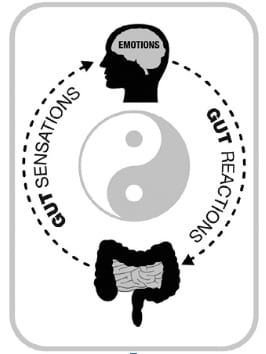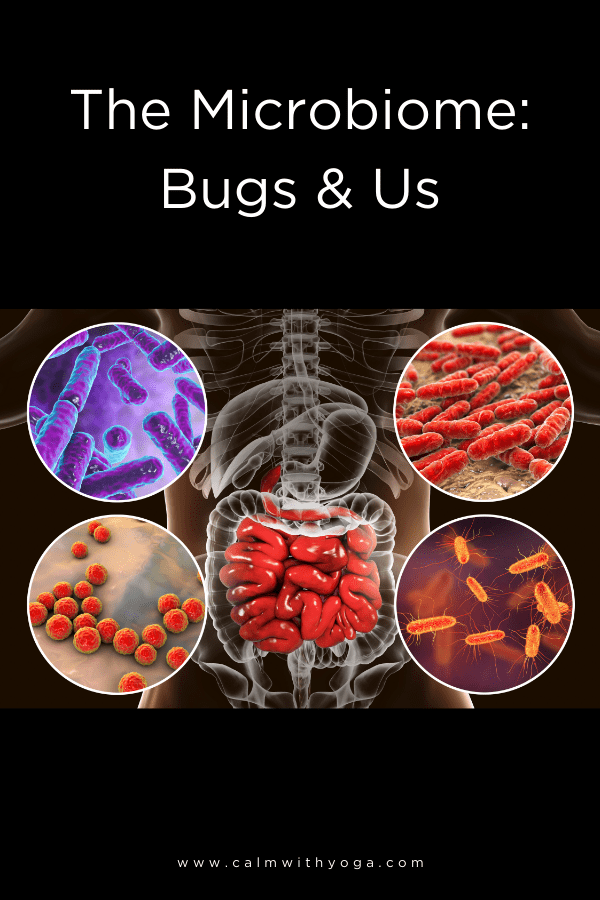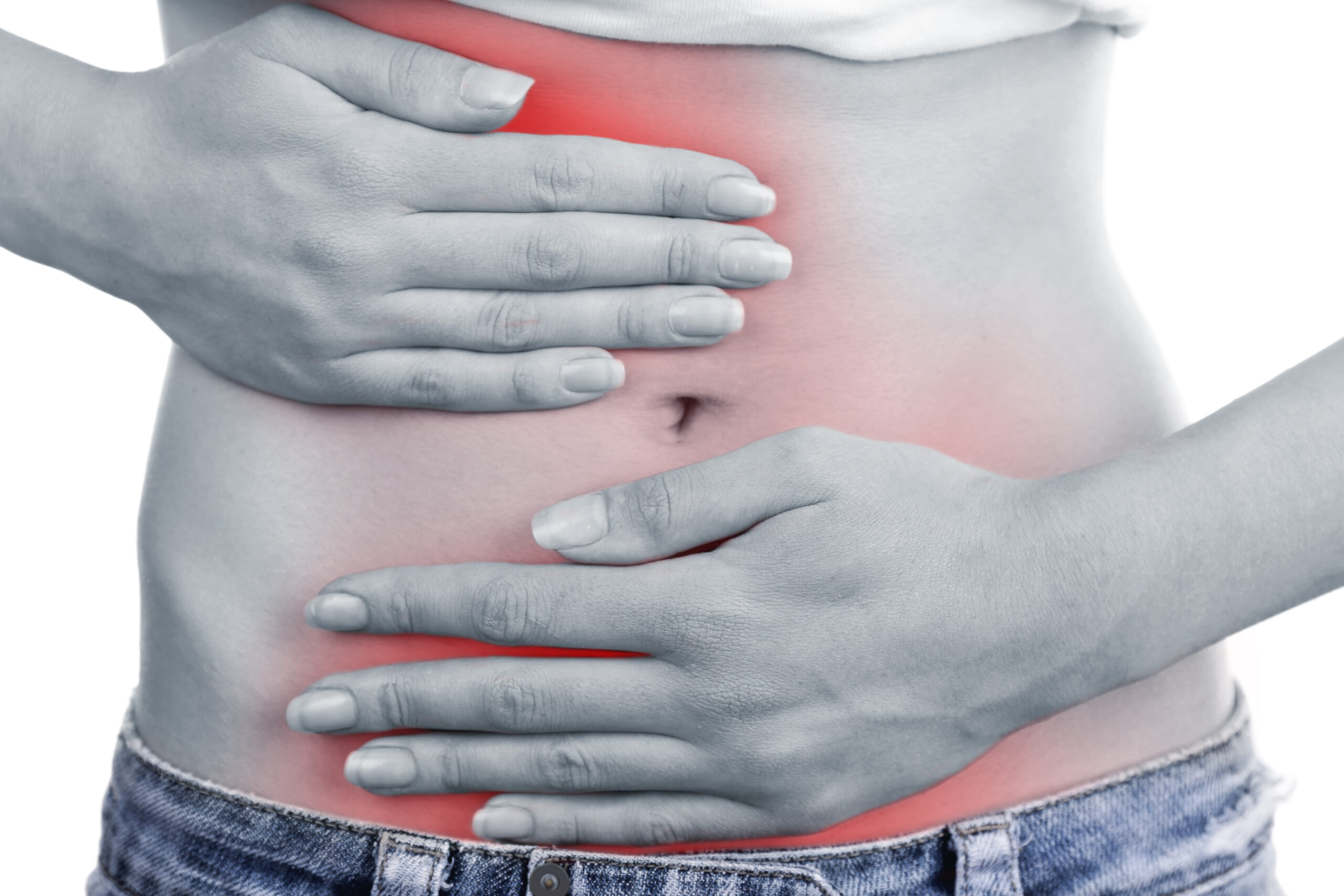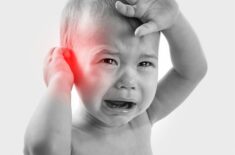All diseases begin in the gut.
– Hippocrates
You have one of your most overlooked prized possessions in the middle of your abdomen and might not even know it.
Your gut anddigestive tractare at the epicenter ofyourhealth.
This isn’t just limited to physical health though.

You may be surprised to hear thatgut healthis intimately tied to emotional and mental health.
In fact, much like the yin-yang symbol in Traditional Chinese Medicine both gut and mind have a complementary relationship.
One impacts the other and vice versa.
Your predominant mental/emotional state and stress levels will greatly influence yourdigestive health.
Conversely, whatever is going on in yourgastrointestinal tract(GI tract) will greatly influence your thoughts, mood, perceptions, choices, and experiences.
This is because your gut has its own brain (aka gut-brain or ‘the second brain’).
Believe it or not, digestive intelligence is a real thing.
Your gut-brain is known as the Enteric Nervous System and it is in constant communication with the brain in your head.
In fact, 90% of the communication goes from gut to head brain and not head brain to gut.(1)

But that’s not all.
Not only do you have a brain in your gut, but you also house an entire universe of over 100 trillionintestinal microbiota(akagut bacteria,gut flora) within the folds of your intestines.
Thehuman guthas ten times moregut microbiotathan human cells. (2)
There are 100,000 times more microbes in your gut alone as there are people on earth. (3)
These microbes include “good” and “bad” bacteria, fungi, viruses, and other single-celled organisms.
Together, they make up what’s called yourgutmicrobiome.
Ahealthy guttends to have more good bacteria thanbadbacteria.
Good bacteria work in unison and harmony with our gut-brain, head-brain,immune system, hormonal system, and nervous system.
Good bacteria can help to regulate our metabolism and sleep cycles, calm an overactive mind, and strengthen our immunity.
Did you know that over 80% of yourimmune systemis located in the gut too?
There’s so much going on in there that no wonder eastern disciplines such as yoga and Chinese Medicine consider the gut a great holder of health, life force, and vitality.
What isgutdysbiosis?
Maintaining harmony in ourGI tractis essential to feeling, thinking, and performing at our best.
Healthy individualshavehealthy gutsand healthy habits.
Unfortunately, we can become our own worse enemy in this department without even knowing it.
Lifestyle choices, diet choices, and excessiveantibiotic usecan all wipe out the good gut bugs while breeding an overgrowth ofharmful bacteriathat can lead to more serious mental and physicalhealth issuesif not addressed.
Thisbacterial imbalanceis known asmicrobialdysbiosis.
Symptoms ofDysbiosis:
How do you know if your gut is in trouble?
Here are a fewcommon symptoms:
- Anxiety/ Depression/ Moodiness
- Brain fog
- Chronic Bloating/Gas/Flatulence/Belching
- Abdominal discomfort, cramping, pains
- Chronic heartburn/ acid reflux
- Constipation
- Diarrhea
- Unexplained weight loss or weight gain or difficulty losing weight
- Micronutrient deficiencies such as vitamin B6.
- Mucus and/or blood in the stool
- Chronic low energy/ fatigue
- Chronic bad breath
- Food sensitivities (especially recent ones)
- Chronic inflammation (which can lead to autoimmunity and other diseases.)
- Leaky Gut (intestinal permeability)
- Nausea
‘Asymptomatic’ Guts:
It may sound scary, but it is possible to be experiencing dysbiosis and GI reactions without experiencing any obvious symptoms:
Typically with dysbiosis, we of course do not see the classic signs of acute infection such as fever, redness, or swelling and usually the location of active dysbiosis has no signs or manifestations or such findings are nonspecific.
For example, many patients with GI dysbiosis, even severe pathogenic GI dysbiosis, have no major clinical GI symptoms, just as patients with sino-respiratory or genitourinary dysbiosis do not present with manifestations of upper respiratory tract infection or a urogenital tract infection.
– Dr. Alex Vasquez, Naturopathic Physician & Functional Medicine Practitioner
Nearly 3 in 20 people in the United States suffer from symptoms or syndromes caused by problems from altered brain-gut interactions, including irritable bowel syndrome, functional heartburn, or functional dyspepsia.
However, those of you who are not bothered by nasty and unpleasant gut sensations should be aware that you don’t have to have any of these disorders for gut reactions to occur.
– Dr. Emeran Mayer, The Mind-Gut Connection
Health ProblemsDue ToGutDysbiosis:
The following have all been linked to an imbalance in the gut:
IBS (irritable bowel syndrome)
Mainly affects thelarge intestine.
Its cause isn’t well understood.
Symptoms include:bloating, cramping, diarrhea, constipation
IBD(inflammatory bowel disease)
It is an umbrella term used to describe digestive disorders involving chronic inflammation of theGI tract.
Types ofIBDinclude Crohn’s Disease andUlcerative Colitis.
SIBO(small intestinal bacterial overgrowth)
Most of the gut bugs can and should be found in ourlarge intestine.
SIBOoccurs when there is an overgrowth of bacteria in thesmall intestine.
What can you do to rebalance your gut?
You can start by increasing the number ofbeneficial bacteriaby choosing to incorporateprobiotic-rich foods.
Common “good” gut bugs found in manyprobioticsupplementsinclude:
- lactobacillus
- bifidobacterium
Here are a fewprobiotic-rich foods:
- fermented vegetables like sauerkraut and kimchi
- yogurt
- apple cider vinegar
- tempeh (fermented soybean)
You can also increase your intake ofprebiotic-rich foods.
Prebioticsare non-digestible fibers that serve as food for your good gut bugs.
These include:
- garlic
- onions
- leeks
- asparagus
- barley
- bananas
- oats
- apples
- konjac root
- cacao
- flax seeds
- seaweed
- leafy greens
- jicama root
- dandelion
- Jerusalem artichoke
- chicory root
Intestinaldysbiosisis also caused by poorly managed stress and anxiety so stress-management tools such as deep breathing, yoga, meditation, and mindfulness are key to keeping up your digestive intelligence, mental health, and well-being.
If you’re experiencing acute symptoms or have been diagnosed with any of the disorders mentioned please consult with your healthcare provider or doctor to decide on the best course of action,treatment options, diet, and supplementation for your particular situation and needs.
REFERENCES
:
(1) https://www.scientificamerican.com/article/gut-second-brain/
(2) https://www.nimh.nih.gov/health/statistics/prevalence/any-anxiety-disorder-among-adults.shtml
(3) Australian Bureau of Statistics. (2008). National Survey of Mental Health and Wellbeing: Summary of Results, 2007. Cat. no. (4326.0). Canberra: ABS.













